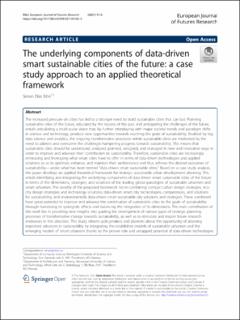| dc.description.abstract | The increased pressure on cities has led to a stronger need to build sustainable cities that can last. Planning sustainable cities of the future, educated by the lessons of the past and anticipating the challenges of the future, entails articulating a multi-scalar vision that, by further interplaying with major societal trends and paradigm shifts in science and technology, produce new opportunities towards reaching the goals of sustainability. Enabled by big data science and analytics, the ongoing transformative processes within sustainable cities are motivated by the need to address and overcome the challenges hampering progress towards sustainability. This means that sustainable cities should be understood, analyzed, planned, designed, and managed in new and innovative ways in order to improve and advance their contribution to sustainability. Therefore, sustainable cities are increasingly embracing and leveraging what smart cities have to offer in terms of data-driven technologies and applied solutions so as to optimize, enhance, and maintain their performance and thus achieve the desired outcomes of sustainability—under what has been termed “data-driven smart sustainable cities.” Based on a case study analysis, this paper develops an applied theoretical framework for strategic sustainable urban development planning. This entails identifying and integrating the underlying components of data-driven smart sustainable cities of the future in terms of the dimensions, strategies, and solutions of the leading global paradigms of sustainable urbanism and smart urbanism. The novelty of the proposed framework lies in combining compact urban design strategies, eco-city design strategies and technology solutions; data-driven smart city technologies, competences, and solutions for sustainability; and environmentally data-driven smart sustainable city solutions and strategies. These combined have great potential to improve and advance the contribution of sustainable cities to the goals of sustainability through harnessing its synergistic effects and balancing the integration of its dimensions. The main contribution of this work lies in providing new insights into guiding the development of various types of strategic planning processes of transformative change towards sustainability, as well as to stimulate and inspire future research endeavors in this direction. This study informs policymakers and planners about the opportunity of attaining important advances in sustainability by integrating the established models of sustainable urbanism and the emerging models of smart urbanism thanks to the proven role and untapped potential of data-driven technologies in catalyzing sustainable development and thus boosting sustainability benefits. | en_US |

